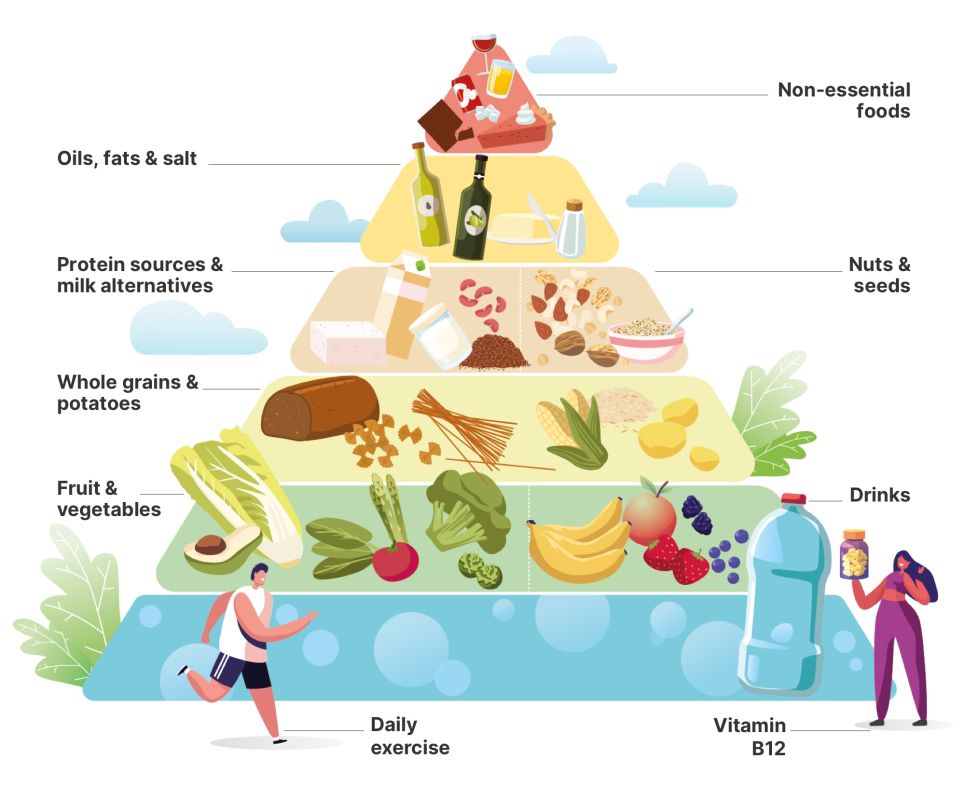Lack of nutrients on a vegan diet: reality or misconception?

Whether you’re already a vegan, are interested in veganism, or the term has so far remained alien to you other than in Veganuary, you have surely heard claims like “A vegan diet is dangerous!” or “You can’t get all the nutrients you need on a vegan diet.” But what’s behind these claims?
Veganism appears to have truly boomed in recent years. More and more meat substitutes and dairy alternatives can be found on our supermarket shelves, while even well-known fast-food chains and restaurants are increasingly offering vegan alternatives. This is also confirmed by the figures in the 2021 nutrition report of the German Federal Ministry of Food and Agriculture (BMEL). While the number of vegetarians in Germany has risen from 5% to 10%, the number of vegans has doubled from 1% to 2%. (1)
People can have very different reasons for choosing a vegan diet. One study shows that most people eat vegan food for animal welfare reasons. But doing something good for the environment or for oneself is also frequently mentioned. Other triggers are taste, an interest in the trend, and religious reasons. (2) If you opt for a vegan diet or you are already a vegan, I would urge you to carefully consider the principles and potential deficiencies.
A deficiency can result from any diet
Whether vegan, vegetarian or omnivore – nobody is safe from a nutrient deficiency. Omnivores who mostly eat fast food will lack important nutrients, as do vegans who simply stop eating animal products overnight. Every diet requires a certain degree of planning and knowledge of which foods provide us with which nutrients. And every diet also has critical and less critical nutrients.
Before I take a closer look at the potentially critical nutrients in a vegan diet, I have compiled an overview of the different food groups here. You may have heard of the food pyramid before. It illustrates the principles of a healthy, balanced diet and indicates which food groups should be consumed and in what quantities. There are similar illustrations from various institutions, such as the German Nutrition Society (DGE) and the Federal Centre for Nutrition (BZfE). They all include dairy products, meat and fish. So, does this mean that a vegan diet cannot be wholesome? Don’t worry! It doesn’t mean that at all. A vegan diet simply needs different rules.
The vegan food pyramid

In terms of structure, the vegan food pyramid is much like the conventional omnivore-focused pyramid. Similarly, drinks – preferably water – should make up the largest proportion of our diet, followed by fruit and vegetables, then whole grains and potatoes.
The first significant difference is the inclusion of nuts and seeds as well as protein sources in the form of legumes, and milk alternatives. They replace the milk, meat and fish products otherwise shown on this rung of the pyramid.
Nuts and seeds contain not only essential fatty acids, but also proteins as well as important vitamins and minerals. Hence, in my opinion, as an ecotrophologist, they should never be left out of any diet – vegan or not. Due to their high calorie content, however, they should not be eaten in excessive quantities – daily without a doubt, but only in moderation.
Legumes, such as peas, beans and lentils, are good sources of vegan protein and should be consumed at least several times a week. Lightly processed products such as tofu or tempeh, however, are also recommendable. Heavily processed meat substitutes with long lists of ingredients, on the other hand, are less advisable.
Milk substitutes and milk alternatives, for example from soy, are another source of protein, while also containing vitamins and minerals. Here again, it is worth examining the list of ingredients. If it contains a lot of ingredients that you don’t recognise or can’t even pronounce, look for an alternative with fewer ingredients.
Oils, fats and salt should be consumed in moderation, as is the case with an omnivorous diet. High-quality oils, which are rich in omega-3 fatty acids, are recommended in particular. Why omega-3 fatty acids are so important and how to incorporate them in a vegan diet is discussed later in this article.
Sweets, alcohol and convenience foods are the only things we do not need to survive. This doesn’t mean that we have to do without them altogether, of course. A slice of home-made cake or a glass of wine with friends – that’s not going to kill you. The dose makes the poison. Enjoyment is a part of life.
Where to find recipes for your next vegan treat will be revealed at the end of this article.
In addition to taking supplements, a wholesome diet should always be complemented with plenty of exercise – though it need not always be sport. A 30-minute walk or regular use of the stairs instead of taking the lift is also beneficial.
Later in this article, you’ll discover what role B12 plays in the vegan food pyramid.
Overview: 10 potentially critical nutrients for a vegan diet
1. Proteins from food provide us with essential amino acids and nitrogen, which are needed by the body to produce proteins. They assume an important role as structural, transport and receptor proteins as well as immune-active proteins and other nitrogen-containing compounds. In addition, amino acids are indispensable to the development of various metabolic products, such as bile acid, serotonin and histamine. Nutritional proteins also supply energy. (3)
Vegan sources of protein:
- Peas, chickpeas, lentils, soybeans, mung beans, lupins, kidney beans, white beans
- Tofu, tempeh, seitan
- Quinoa, amaranth, buckwheat, oatmeal
- Walnuts, almonds, cashews, Brazil nuts, peanuts,
- Hemp seeds, chia seeds, pumpkin seeds, sunflower seeds
- Wholegrain products such as wholegrain bread or wholegrain pasta
- Soya drinks & yoghurt, pea drink & yoghurt
2. Long-chain omega-3 fatty acids are important for growth and brain development. In addition, they play a part in cardiovascular health. By positively influencing the flow of blood, they can protect us from dangerous deposits in the blood vessels. They also have an influence on muscle function as well as on inflammatory and immune reactions. (4)
Vegan sources of omega-3 fatty acids:
- Rapeseed oil, walnut oil, soya oil, linseed oil
- Flax seeds, chia seeds, hemp seeds, walnuts
- Microalgae, algae oil
Beware! Seeds, nuts and oils contain alpha-linolenic acid only. Though it is also an omega-3 fatty acid, it is merely a precursor of the important long-chain fatty acids EPA and DHA. Alpha-linolenic acid can be converted by the body into EPA and DHA. Since the conversion rate fluctuates, however, I would advise getting a medical opinion, if necessary. Microalgae and algae oil, on the other hand, do contain EPA and DHA and can thus provide us with the important fatty acids we need directly.
3. Vitamin D helps strengthen the bones by participating in calcium and phosphate metabolism. We also need vitamin D for other metabolic processes in the body, however. It has an influence on muscle strength and the immune system. (5)
Special feature of vitamin D: The body can produce vitamin D itself when the skin is exposed to sunlight. The majority of the vitamin D we get is obtained in this way. Food provides us with only a very small amount of vitamin D. Vegan sources of vitamin D include mushrooms, chanterelles, porcini mushrooms and margarine, for example. The production of vitamin D with the aid of sunlight depends on various factors, such as the time of day and time of year, the weather, and the latitudes in which we live. Therefore, I would advise you to discuss the best solution with your doctor whatever your chosen diet.
4. Vitamin B2, also called riboflavin, contributes to numerous reactions in our protein and energy metabolism. Riboflavin is also relevant in the metabolism of other vitamins. Furthermore, it helps preserve the protective layer that surrounds our nerve pathways and wards off diseases. It is also important to detoxification – more precisely, the breakdown of drugs in the body. (6)
Vegan sources of vitamin B2:
- Mushrooms, oyster mushrooms
- Almonds, cashews, peanuts, hazelnuts, walnuts, pumpkin seeds
- Broccoli, kale, spinach, Brussels sprouts, red peppers, avocados
- Wholegrain bread, oatmeal
- Soybeans, lentils, mung beans
5. Vitamin B12 is not only involved in DNA synthesis, but also plays a key role in blood formation and is therefore extremely important. It also helps break down fatty acids. (7)
Special feature of vitamin B12: Vitamin B12 can only be produced by microorganisms. Humans and animals ultimately obtain vitamin B12 through the food chain. Therefore, animals are a good source of vitamin B12. Although vegan foods such as seaweed or shiitake mushrooms also contain vitamin B12, their content varies enormously. Therefore, it is quite clear that vitamin B12 needs to be taken permanently when following a vegan diet.
6. Calcium is especially important for our bones and teeth. As a structural component, it ensures their stability. In addition, we need this mineral for blood clotting, stabilisation of the cell walls, signal transmission in muscle and nerve cells, and the conduction of stimuli in the cells. (8)
Vegan sources of calcium:
- Calcium-rich mineral water, enriched plant milk
- Sesame seeds, chia seeds, flax seeds
- Almonds, hazelnuts, pistachios, Brazil nuts, walnuts
- Kale, rocket, kohlrabi, spinach, broccoli
- Soybeans, tofu, oatmeal
7. Iron is bound to haemoglobin (red blood pigment) and myoglobin (red muscle pigment) and helps transport oxygen in the body. It contributes to blood formation and is critical to other metabolic processes. In particular, it is essential to optimal brain development in children and adolescents. (9)
Vegan sources of iron:
- Sesame seeds, hemp seeds, flax seeds, pumpkin seeds
- Pistachios, almonds, hazelnuts, walnuts
- Oatmeal, amaranth, quinoa, buckwheat, wholegrain pasta, wholegrain bread
- Soybeans, mung beans, chickpeas, lentils
- Apricots, plums
- Spinach, rocket, kale, beetroot
Tip: Iron absorption can be improved by also taking vitamin C. So it is worth drinking a freshly squeezed orange juice with your morning muesli.
8. Iodine is needed for the production of thyroid hormones, which activate our energy metabolism and promote growth and bone formation. (10)
Vegan sources of iodine:
- Algae
- Iodinated table salt
9. Zinc takes on a wide range of tasks in the body and is involved in numerous processes. It is important not only for protein, carbohydrate and fat metabolism, but also for hormones and receptors. Zinc is also involved in insulin storage and activation of the immune system. (11)
Vegan sources of zinc:
- Sesame seeds, flax seeds, chia seeds, sunflower seeds, pumpkin seeds
- Peanuts, walnuts, almonds, cashew nuts, hazelnuts
- Oatmeal, amaranth, buckwheat, quinoa, wholegrain bread, wholegrain pasta
- Soybeans, chickpeas, lentils, tofu
10. Selenium is an important component of antioxidant enzymes that protect us from free radicals and thus prevent cell damage. It also promotes the production of thyroid hormones and strengthens the immune system. (12)
Vegan sources of selenium:
- Brazil nuts, walnuts, peanuts, almonds
- Fresh porcini mushrooms
- Peas, chickpeas, lentils
- Wheat pasta, oatmeal, buckwheat
As you may have noticed, it is also possible to get all the important and potentially critical nutrients from a vegan diet. The only exception is vitamin B12, which should be taken as a supplement. Regardless of the type of diet, vitamin D occupies a special position, as we can mostly produce it ourselves through exposure to sunlight. In this respect it is always useful to consult a doctor.
So the conclusion is that, like any diet, veganism depends on proper planning and an awareness of what should be consumed to obtain all the nutrients you need. If you remember that, then all that remains is to give it a go and enjoy!
Source references (in German):
1) https://www.bmel.de/DE…
2) https://veganz.de/wp-content/…
3) https://www.dge.de/wissenschaft/faqs/protein/
4) https://www.dge.de/…
5) https://www.dge.de/wissenschaft/faqs/vitamin-d/
6) https://www.dge.de/wissenschaft/faqs/riboflavin/
7) https://www.dge.de/wissenschaft/faqs/vitaminb12/
8) https://www.dge.de/wissenschaft/faqs/calcium/
9) https://www.bfr.bund.de/…
10) https://www.dge.de/uploads/…
11) https://www.dge.de/wissenschaft/faqs/zink/
12) https://www.dge.de/wissenschaft/faqs/selen/
Images: © foodfittery


